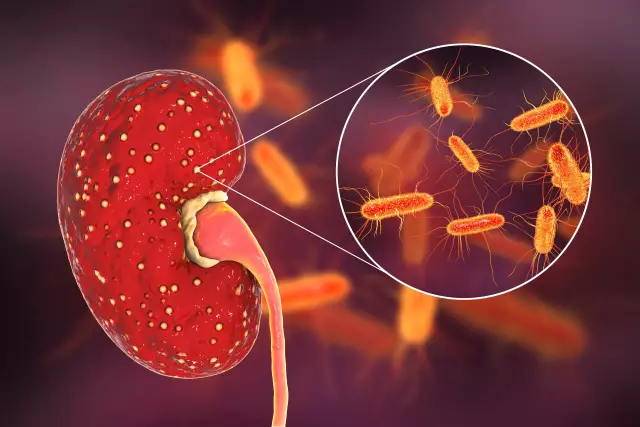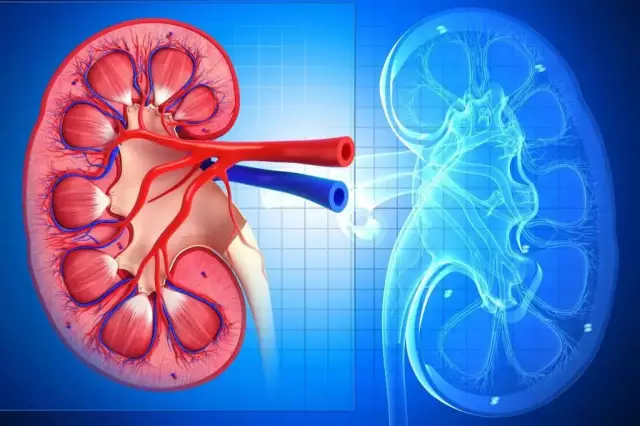- Author Rachel Wainwright wainwright@abchealthonline.com.
- Public 2023-12-15 07:39.
- Last modified 2025-11-02 20:14.
Interstitial nephritis

Interstitial nephritis (tubulointerstitial nephritis or tubulointerstitial nephropathy) is a pathological process characterized by chronic or acute inflammatory lesions of the kidney tubules and interstitial tissue. The causes of interstitial nephritis can be the use of drugs for infections, obstruction of the urinary tract, metabolic disorders, toxic effects and malignant neoplasms.
In acute interstitial nephritis, inflammatory changes in the kidney tissue occur, which as a result can lead to the development of renal failure.
In chronic interstitial nephritis, fibrosis of the interstitial tissue develops, glomeruli damage (at a late stage of the disease) and tubular atrophy. When neglected, chronic interstitial nephritis leads to nephrosclerosis (wrinkling of the kidneys).
Interstitial Nephritis Causes
Interstitial nephritis can occur due to the following medications:
- Beta-lactam antibiotics;
- Fluoroquinolones;
- Sulfonamides;
- Non-steroidal anti-inflammatory drugs;
- Diuretics.
The development of acute interstitial nephritis can lead to the use of drugs such as:
- Allopurinol;
- Ampicillin;
- Gentamicin;
- Ibuprofen;
- Immunosuppressants;
- Captopril;
- Cloxacillin;
- Naproxen;
- Penicillin;
- Rifampicin;
- Thiazide diuretics;
- Phenytoin;
- Fenapdion;
- Cephalothin.
Also, the causes of interstitial nephritis are bacterial (diphtheria, streptococcal infections, legionellosis and leptospirosis) and viral (Epstein-Barr virus, cytomegalovirus and arboviruses) infections, immune diseases (Sjogren's syndrome, systemic lupus erythematosus, kidney transplant rejection syndrome, and cryoglobulinemia) and multiple myeloma.
Chronic interstitial nephritis is caused by obstruction of the urinary tract, granulomatous diseases, impaired metabolism of cystine, urate, calcium and oxalate, vesicoureteral reflux, and prolonged exposure to heavy metals.
Sometimes it becomes impossible to establish the cause of interstitial nephritis - in such cases, the term "idiopathic interstitial nephritis" is used.
Interstitial nephritis symptoms
The clinical manifestations of interstitial nephritis are eosinophilia, fever, and skin rash. Fever is a symptom of interstitial nephritis, which is observed in almost all patients. A skin rash is a symptom of interstitial nephritis, which occurs in about half of patients. The places of its occurrence are the trunk and proximal parts of the extremities, often a skin rash is accompanied by itching.
Also, the symptoms of interstitial nephritis are:
- Arthralgia;
- Back pain;
- Macrohematuria;
- Moderate proteinuria;
- Leukocyturia;
- Microhematuria;
- Proteinuria;
- Enlarged kidneys;
- Elevated IgE in the blood;
- Polyuria;
- Oliguria.
Interstitial Nephritis Treatment
Treatment of interstitial nephritis (acute) consists in the withdrawal of medications that may be the cause of its occurrence. When taking a course of antibiotics, non-steroidal anti-inflammatory drugs and other medications, it is necessary to re-examine the content of urea and creatinine in the blood serum, determine the daily urine output, frequent checks and urine tests, and, if possible, replace nephrotoxic agents with non-toxic ones.

Important elements of the treatment of interstitial nephritis are: ensuring adequate hydration of the patient, reducing the doses and frequency of administration of other drugs, abolishing renal impairing drugs and angiotensin-converting enzyme inhibitors. If interstitial nephritis leads to an increase in renal failure, then it is necessary to take Prednisolone (60 mg per day for 10-14 days).
In severe renal impairment, it is possible to use pulse therapy with Methylprednisolone (1 g intravenously daily for three days).
In the treatment of interstitial nephritis, accompanied by oligoanuria and a rapid increase in creatinine levels, it is necessary to prescribe hemodialysis.
The patient with interstitial nephritis should be informed that the use of the drug that caused the development of the disease is unacceptable in the future, since repeated administration of this drug can lead to the development of catastrophic renal failure.
YouTube video related to the article:
The information is generalized and provided for informational purposes only. At the first sign of illness, see your doctor. Self-medication is hazardous to health!






